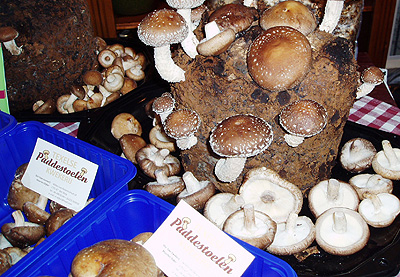This week our group went Texel; what an inspiring people we met this week! While on the mainland people are talking about propositions for a circular or blue economy, the people on Texel are actually doing it. As TUDelft students we were coming to the island to bring innovative solutions. However, this week we discovered that Texelaars are perfectly capable to do this themselves. But more importantly, they also make it happen. With a clear vision and expertise on Texel as a market, they are inventive on the ‘Texel-way’: doing things with what is available. Without knowing it, they are implementing innovative sustainable strategies, where people on the mainland have gatherings on to explore these strategies. Something we as TUDelft students can learn from in making sustainable transitions happen. Allow me to give some inspiring examples.
For our research we went to the Texelse Paddenstoelen kwekerij were we had an interview with Maarten Dijker. A man, who invented his own way of cultivating shiitake mushrooms with things that are available around him. In a barn with shelving of a flower company, buckets with water from a bakery and waste wood scrap, he is able to cultivate mushrooms on a flexible manner that is adaptable to the changing demand of shiitake mushrooms. Another inspiring example is the company ‘Texelsvilt’, who transformed the wool of the ‘Blauwe Texelaars’ sheeps without any value into valuable interior products. Starting from their own passion they have transformed a local waste product into a cash flow.
When meeting these inspiring people, it was noteworthy that during these conversations the word sustainability was often not mentioned by themselves. Instead they all speak from a passion. As Maarten described; in the end it must be economical feasible so I can live my Texel lifestyle. Their initiative provides a way of living on ‘de Texelse manier’; using everything what is locally available to create a financial efficient lifestyle. In that sense, the sustainable blue economy strategy is in fact incorporated in their culture with smart, sometimes even low-tech, inventions.
I believe that as TUDelft students, we can learn that sustainability does not always asks for high-tech solutions. Sometimes sustainability needs a service or small low-tech solutions. Nature uses what is currently available. We need to open our eyes on what is locally available, just like the Texelaars. Although this might seem like it leads to the most obvious solutions, they are often not. Because of the take-make-dispose economy, we have become blind of what is around us. We are blinded by fancy flashy technology, while in fact they are often based on scarce resources. I was really surprised by the inventiveness of Texelaars and their use of locally resources that are abundantly available. They enhanced my believing in the blue economy. This is the place were the blue economy is actually happening. Why shouldn’t we if it is more sustainable and cost-effective? What is more sustainable than using things that nature already provides?
